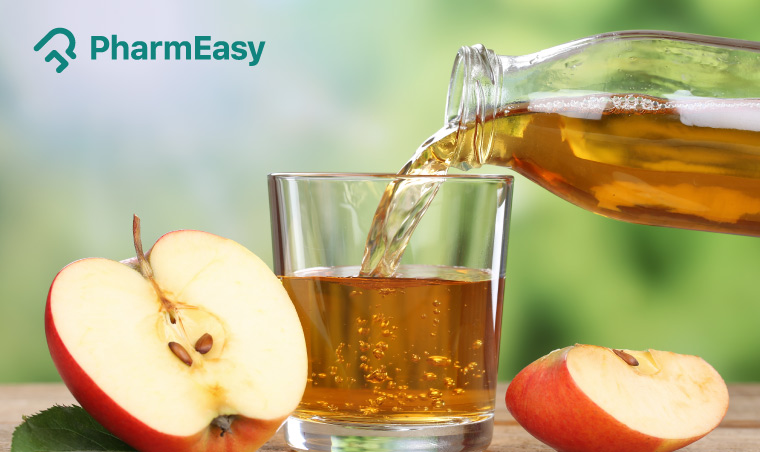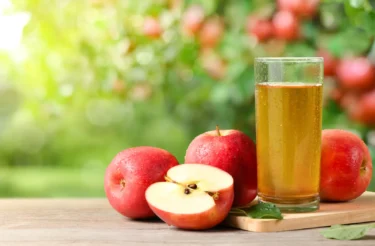Apple Juice: Uses, Benefits, Side Effects and More!
By Dr Ashok Pal +2 more

Get,

to manage your symptom
Get your,


4 Cr+ families
benefitted

OTP sent to 9988776655



You’ve successfully subscribed to receive
doctor-approved tips on
Whatsapp

Get ready to feel your best.

Hi There,
Download the PharmEasy App now!!


Register to Avail the Offer
Send OTPBy continuing, you agree with our Privacy Policy and Terms and Conditions

Hi There,
Sign up on PharmEasy now!!
Trusted by 4 crore+ families

OTP sent to 9988776655



You have unlocked 25% off on medicines




Code: NU25
By Dr Ashok Pal +2 more
Table of Contents
When someone says “A for…” almost all of us complete the sentence by saying apple without even batting an eyelid. If you think about it, you will find that apples are so common all across the world that they are featured in legends and fairy tales. You might notice that it dropped in on crucial scientific discoveries too (remember Newton and his apple tree that led to the discovery of gravity?). So, though the apple might seem like a humble fruit, it might have hidden greater potential.

Apples have caught the attention of researchers worldwide and for all the good reasons. It is a versatile, accessible and inexpensive fruit. Moreover, it has various bioactive components in it which might have various positive health benefits. You might have heard the saying “An apple a day keeps the doctor away”, let’s read and find out if the mentioned proverb holds some value1.
Did you know?
The nutrients present in apple juice are as follows
| Nutrients | Percentage content |
| Water | 88.2 |
| Carbohydrate | 11.3 |
| Protein | 0.1 |
| Fats | 0.13 |
| Sugar | 9.62 |
| Fibre | 0.2 |
Apple juice might have the following properties that might be helpful for us:
A study I came across explored the use of dilute apple juice as a form of initial oral hydration in children with mild gastroenteritis and minimal dehydration. Using dilute apple juice as a suitable alternative for children with mild gastroenteritis might provide relief and potentially lead to fewer negative outcomes compared to using electrolyte maintenance solutions3.
Dr. Siddharth Gupta, B.A.M.S, M.D (Ayu)
Apple juice might possess the properties mentioned above and may be truly a boon for our health. However, there is a need for more research that can provide concrete scientific evidence for the use of apple juice for its health benefits. The potential uses mentioned below are drawn from the studies currently available.

White et al. conducted a randomized control trial and studied the effect of apple juice on the blood sugar level in people. The team of researchers found that the blood sugar levels did not increase after drinking apple juice. They also found that apple juice might also help in decreasing blood sugar after some time. This shows that apple juice might potentially help people with diabetes. However, there is a need for more studies to confirm such claims1. Moreover, diabetes is a serious condition that must be diagnosed and treated by a doctor, and not treated at home.

In a special study conducted by Wruss et al., researchers found that apple juice might potentially reduce oxidative stress in the body due to its apparent antioxidant activity. They found an increase in antioxidant activity just after the introduction of apple juice, but it decreased after some time and increased again after a few more hours. Therefore, the potential use of apple juice as an antioxidant to help reduce oxidative stress is still unclear and will require more studies to prove it.
In light of what I’ve perceived, based on some research, it says that oxidative stress might play a role in causing asthma, both in experimental models and in humans. Here’s the good news! Apple products, such as apple juice, may protect against asthma due to their antioxidant properties and the presence of beneficial plant compounds5.
Dr. Smita Barode, B.A.M.S, M.S.

Multiple studies were conducted to study the possible effect of apple juice on body fat. Some of them showed no significant change in body fat. However, a study1 by Barth et al. on men showed that apple juice might help with body fat reduction, but the results were inconsistent. They found that the person’s genetic makeup might play an important role. They didn’t find any difference in body mass index and waist circumference. Therefore, more studies will be required to ascertain the potential use of apple juice for weight management.

Apple juice might have potential use for cancer. This may be due to the action of apple juice as an antioxidant. It might help reduce the oxidative stress and possible DNA damage that causes cancer. Thereby, it may help with cancer. However, there is a need for much more extensive research to prove such claims1. Cancer is a serious condition and must be diagnosed and treated by a doctor.

Several studies were conducted on the potential use of apple juice for diseases related to the brain. Some of the studies showed that apple juice might be helpful for people with dementia and Alzheimer’s disease. It might help with the symptoms of dementia like anxiety, delusion and agitation. However, more studies are required to prove the potential use of apple juice for diseases related to the brain1. Please ensure you consult a doctor as diseases of the brain are serious and should be diagnosed and treated by a doctor.

The other potential uses of apple juice are:
Though there are studies that show the potential uses of apple juice in various conditions, these are insufficient and there is a need for further studies to establish the true extent of the benefits of apple juice on human health.
Based on my observations, some findings suggest apple products like apple juice might have a protective effect on colon diseases. This may be attributed to the increased availability of polyphenols in the colon by consuming such apple products4.
Dr. Rajeev Singh, BAMS
You may use apple juice in the following ways:
You must consult a qualified doctor before taking any herbal supplements. Likewise, do not discontinue or replace an ongoing treatment of modern medicine with an ayurvedic/herbal preparation without consulting a qualified doctor.
It was observed in a study that clear apple juice might have some negative effects on women. So, it is better that you visit a doctor and take their advice before drinking apple juice. There might be more side effects of drinking apple juice which may be validated with further studies. However, presently there is limited knowledge about the side effects of apple juice on humans. Therefore, you should consult a doctor before using apple juice. Kindly do not self-medicate, alter, replace or discontinue any ongoing treatment on your own1.
Also Read: Carrot Beetroot Juice: Uses, Benefits, Side Effects and More!
It is important to take a few general precautions before drinking apple juice, as all of its effects on humans are not fully known. You should be especially careful while giving it to children and elderly individuals. Extra caution is also to be taken by pregnant and breastfeeding women. Kindly do not self-medicate, alter, replace or discontinue any treatment on your own. Instead, you should visit a doctor and seek medical advice.
Also Read: Cucumber Juice: Uses, Benefits, Side Effects and More!
There is a need for more studies to establish that apple juice does not react adversely to any drug. So, it cannot be considered safe unless more research is done with conclusive results. Therefore, it is advised that you consult a doctor before using apple juice for human health. One must always disclose all the current medications being used so that the doctor can advise accordingly.
Also Read: Watermelon Juice: Uses, Benefits, Side Effects and More!
Apple juice contains various nutrients that might help with diabetes, heart health, inflammation, etc. However, more studies are required to prove such claims1. However, more research is required. Moreover, one must consult a doctor for all serious conditions.
There is no evidence that drinking apple juice on an empty stomach may be helpful. Therefore, there is a need for more research.
No. You should consult a doctor and your doctor will advise you if drinking apple juice is required or not. Kindly do not self-medicate. Do not alter, replace or discontinue any ongoing treatment.
There is no evidence claiming that apple juice can fight all diseases. In fact, there is no evidence that any one single food item can fight against all disease. More thorough research will be required to prove such statements. Its wise to not fall prey such false claims for any food items.
Apple juice contains carbohydrates, proteins, sugars, vitamins (A, C, B) and minerals (iron, calcium, potassium, etc.)2.
A study showed that clear apple juice might have negative effects on women. There may be more side effects of apple juice as well. However, there is a need for more research to study all the side effects of drinking apple juice. Therefore, you should consult a doctor before drinking apple juice1.
A few studies conducted showed that apple juice might help to reduce fat in the body while a few other studies showed that it had no significant effect on weight. Therefore, the amount of research present is inconclusive on the potential effects of apple juice on weight management. More studies will be required to prove such claims1.
No reports or studies are available to claim the potential use of apple juice for skin. Therefore, more studies will be required to prove the possible effects of apple juice on the skin, if any.
The potential uses of apple juice for women and men are similar. There are no separate benefits of apple juice stated for men presently. Apple juice might help with diabetes, cancer, oxidative stress, etc. However, there is a need for more studies to prove such claims1. Please ensure that you consult a doctor for health issues.
Disclaimer: The information provided here is for educational/awareness purposes only and is not intended to be a substitute for medical treatment by a healthcare professional and should not be relied upon to diagnose or treat any medical condition. The reader should consult a registered medical practitioner to determine the appropriateness of the information and before consuming any medication. PharmEasy does not provide any guarantee or warranty (express or implied) regarding the accuracy, adequacy, completeness, legality, reliability or usefulness of the information; and disclaims any liability arising thereof.
Links and product recommendations in the information provided here are advertisements of third-party products available on the website. PharmEasy does not make any representation on the accuracy or suitability of such products/services. Advertisements do not influence the editorial decisions or content. The information in this blog is subject to change without notice. The authors and administrators reserve the right to modify, add, or remove content without notification. It is your responsibility to review this disclaimer regularly for any changes.
Comments

Leave your comment...
You may also like
Comments